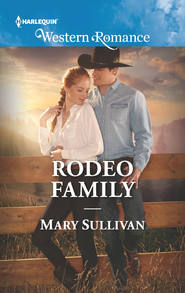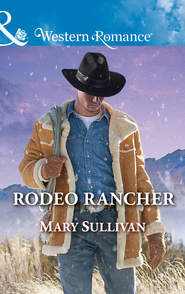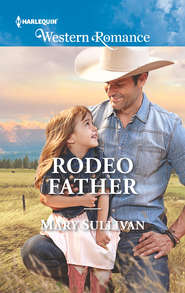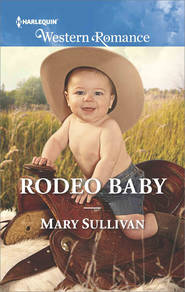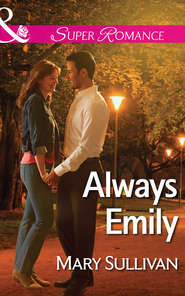По всем вопросам обращайтесь на: info@litportal.ru
(©) 2003-2024.
✖
A Cowboy's Plan
Автор
Год написания книги
2019
Настройки чтения
Размер шрифта
Высота строк
Поля
Liam sat at the far side of the table, his nimbus of white-gold hair lit by sun streaming through the kitchen window, turning him into an angel. The kitchen smelled of coffee and bacon and eggs, all of the old familiar scents that should have brought comfort.
C.J. placed the box of breakfast cereal and a spoon on the table in front of Liam, carefully, then stepped away.
“Gramps,” he called, “you got a minute?”
“Yep.” Gramps’s voice drifted from the living room followed by the sounds of him folding the newspaper, then shuffling down the hall. All for the sake of one little boy.
C.J.’s grandfather entered the kitchen, stooped and leaning on his cane. When had his shoulders started to roll forward so much?
Gramps glanced at Liam’s mulish expression and said, “Someone else used to look like that when he didn’t get his way.”
C.J. couldn’t smile at Gramps’s attempt to lighten the mood, to pretend that Liam’s actions were normal for his age. C.J. had never been so stubborn that he wouldn’t let his own father take care of him.
Gramps, stalled by the hurt C.J. knew showed on his face, gestured with his head toward the living room. “Take your coffee and go read the paper.”
While Gramps poured Liam a bowl of oversweetened cereal, then poured milk on it—doing the things that C.J. wanted to do himself—C.J. passed behind Liam to refill his mug.
Mug full, he reached a hand to the back of his son’s head, to stroke it, but thought better of it. Liam would shrug it off anyway.
C.J. set his jaw and strode to the living room. He stopped in front of the window and stared out at the fields lying fallow. Waste of good land. He needed to get the store sold and out of the way so he could ranch full-time.
Always so much damn waiting.
His grandmother’s old lace curtains smelled dry and dusty. No wonder. She’d been gone ten years. He noticed something white tangled in the lace. Dental floss. Gramps had used it to mend a tear.
C.J. wouldn’t have done any better himself. Weren’t they the pair? Now, his young son had entered the house and the job of turning him into a grown man was all on C.J.’s shoulders.
Damn, what a load. C.J. exhaled roughly.
Gramps’s two-step limp sounded behind C.J.
“He’s eating.” Gramps placed one arthritic hand on C.J.’s shoulder. The affection and heat of the touch eased some. “He’s still young.”
“Am I spoiling him by giving in?”
“With any other kid I’d say yes, but not with Liam. He lived a hard couple of first years.”
“What did Vicki tell Liam that makes him dislike me so much?” C.J. cursed her to hell and back. It was bad enough that she was bleeding him dry. Why did she also have to turn his son against him?
“Some kind of poison that made sense in her own mind, I guess.” Gramps settled onto the sofa with a huff of pain.
“The drugs changed her,” C.J. said. “She wasn’t always like that, Gramps. Not at the beginning.”
“I know.” The newspaper rustled behind C.J.
“Has Liam ever mentioned what his mother said about me?”
“Nope. Not a word.”
C.J. stared at his coffee mug on the windowsill. The stains of old coffee, where he’d set his mug on this same windowsill and stared at these same fields, stood testament to the countless mornings he’d done this. Lord, how much longer before Liam began to accept and trust him?
“Keep being kind and patient with the boy,” Gramps said. “He’ll come around in time.”
C.J. paced the length of the room. “It’s been eleven months.” Eleven long months of bashing his head against Liam’s resistance.
He ran his hand over the bristle on his scalp. When he’d brought Liam home to live with him, he’d shaved his hair military short and had traded in cowboy shirts and jeans for more conservative clothing, so damn afraid that Child and Family Services would find some crazy excuse to take the boy away from him. He missed his hair.
Oh, grow up.
C.J. headed for the hallway. He couldn’t believe he’d just thought something so stupid. Every change he’d made was worth it if it kept his son safe with him on the ranch.
“You two have a good day.” With one hand on the front doorknob, he called, “Liam, you have fun with Gramps today.”
No answer. The ring of a spoon against cheap china followed C.J. out the door.
JANEY WILSON CROUCHED in the shade of the weeping willow on the lawn of the Sheltering Arms Ranch. Its branches soughed in the hot breeze scuttling across the Montana landscape.
She stared at the delicate child in front of her whose gaze was as wide-open as the prairie surrounding them.
“Katie,” she said, “I can’t play with you right now.” Liar. “I need to go do something.” Coward. “It’s something important I have to do right away. Okay?”
Katie stared with solemn brown doe eyes, silent and wise before her time and so much like Cheryl Janey couldn’t breathe.
Sunlight, filtered by the leaves of the tree, dappled Katie’s face, underlining the dark circles beneath her eyes and highlighting her sallow skin.
Cancer did terrible things to children.
Unforgivable things.
Janey touched Katie’s small shoulders, the thin cotton of her old T-shirt worn soft. She nudged Katie toward the field across the driveway where the ranch’s latest batch of inner-city kids played a game of touch football.
“Hey, you little hoodlums,” the ranch foreman, Willie, yelled, “this ain’t tackle football.”
Willie lay on the ground under a wriggling pile of giggling children—all of them cancer survivors.
Janey closed her eyes. She couldn’t take much more of handling these children daily while her heart bled.
“How long are you going to keep this up?” Startled by the rasp of a bark-dry voice behind her, Janey spun around. Hank Shelter stood on the veranda of his house watching her, his big body relaxed and leaning against a post, but his eyes too perceptive. She tried to hide her pain, but wasn’t fast enough.
“How much longer can you do this?” he asked.
Before she answered, he raised a hand. “Don’t insult my intelligence by claiming you don’t know what I’m talking about.”
She exhaled a breath of frustration. “Hank, I’m okay, really. I’m dealing.”
“No, you aren’t dealing, Janey.” The regret on Hank’s face broke her heart. “You haven’t been able to in the year you’ve lived here.”
“I can try harder,” she insisted.







